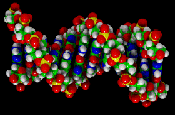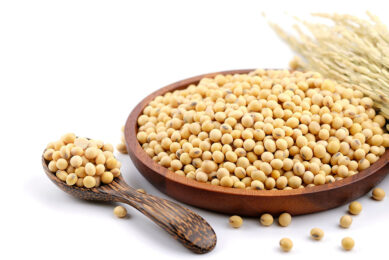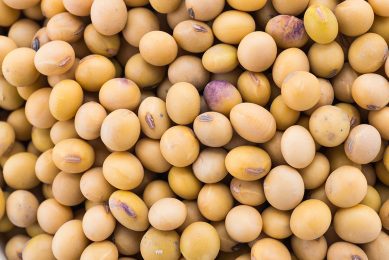Soybean genome unravelled

Soybean, one of the most important global sources of protein and oil, is now the first major crop legume species with a published complete draft genome sequence.
This sequence, which essentially provides a parts list of the soybean genome, will help scientists use the plant’s genes to improve its characteristics.
Scientists will use the new sequence to identify which genes are responsible for particular plant characteristics, and then target specific genes to produce desired characteristics.
These desired characteristics may include
- Increases in the plant’s oil content to promote the use of soybean oil as a biofuel;
- Bigger crops;
- Improved resistance to pests and diseases that currently claim large percentages of soybean crops;
- Improvements in the digestibility of soybeans by animals and humans; and
- reductions in contaminants present in the manure of soybean-fed swine and poultry that may pollute farm runoff.
The research team plans to identify which soybean genes warrant targeting by comparing the genomes of different varieties of soybean plants to one another.
They also aim to resequence 20,000 soybean lines that are currently stored in the National Plant Germplasm System to identify desired variances of genes that are not currently captured by domesticated soybean lines.
Genes left behind
"When soybeans were domesticated, they were selected for seed size and other traits, but there were a lot of potentially valuable genes left behind," said Scott Jackson of Purdue University–the corresponding author on the soybean genome paper.
"There may be valuable genes associated with protein content or disease resistance in the stored lines that are not currently in the cultivated lines."
Having the new soybean sequence as a reference will significantly speed and reduce the costs of resequencing the 20,000 stored soybean lines.
The close coordination of support for the project was facilitated by the National Plant Genome Initiative, which is managed by the Interagency Working group on Plant Genomes, whose members include DOE, USDA and NSF.
Funding for the mapping/sequencing study was also provided by the United Soybean Board.
The soybean sequencing study appears as the cover story of the January 14 edition of Nature, Genome sequence of the palaeopolyploid soybean
Join 26,000+ subscribers
Subscribe to our newsletter to stay updated about all the need-to-know content in the feed sector, three times a week. Beheer
Beheer









 WP Admin
WP Admin  Bewerk bericht
Bewerk bericht